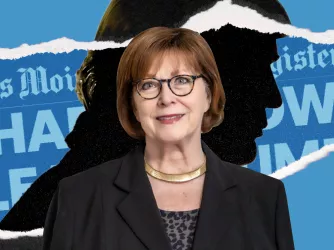Table of Contents
Free Speech Victory at Tufts University: Charges of "Sexual Harassment" against Student Newspaper Dismissed

FIRE summer intern Sam Ben-Ur examines the history of free speech at Tufts University. (Postmodern Studio / Shutterstock.com)
MEDFORD, MA—In a unanimous vote, a hearing panel at Tufts University voted to dismiss charges of sexual harassment against a student newspaper that had satirized a campus student leader. The Foundation for Individual Rights in Education (FIRE) advised the paper's editors and communicated vigorously with the administration on their behalf. Thor Halvorssen, Executive Director of FIRE, said: "We are delighted that Tufts chose not to trample on the principles of free speech. This is a victory for everyone who values genuine pluralism."
In a case that illustrates the threat to liberty posed by speech codes, The Primary Source, a student publication that describes itself as the "Journal of Conservative Thought at Tufts University," was the target of the sexual harassment complaint as a result of a cartoon and written parody that it published.
"The expression almost forbidden to The Primary Source is undeniably parody and satire, areas of political speech that are at the core of America's honored traditions," said Halvorssen. "Indeed, parody and satire, especially of leaders and activists, exist to challenge, amuse, and even to offend. The paper also included jokes that mocked President Bush, Madonna, Stevie Wonder, Strom Thurmond, and the New York Yankees. Some college students and administrators are under the impression that students have a right not to be offended, which teaches students to call any offense 'harassment' and to run to the Thought Police."
Last month, Iris Halpern, an undergraduate student, filed charges with the Dean of Students and the Office of Equal Opportunity, claiming that a cartoon and written remarks in the journal of opinion had made her into a "sex object." Halpern, a vocal member of the Student Labor Action Movement (SLAM), was offended when the paper mentioned "Tight SLAM tank-tops" — a supposed reference to Halpern's own clothing. The paper also published a cartoon of a female dressed in tight clothing with a SLAM logo on the front of her shirt.
If the charges had succeeded, the paper would have been stripped of funding, denied the use of the Tufts name, prohibited from meeting in any campus room that required a reservation, and barred from advertising or announcing any of its events or meetings. Days before the hearing, the paper's editor-in-chief, Sam Dangremond, contacted FIRE and asked for advice and intervention. "I was unsure about what to do and felt helpless," wrote Dangremond; "the loosely worded Tufts sexual harassment policy was used as a weapon against free speech."
Hoping that Tufts would spare itself the embarrassment of fighting against the principles of freedom of speech and legal equality, FIRE wrote to the administration, reminding them of two prior free speech cases at Tufts where FIRE successfully intervened. Dangremond, a junior from Kingston, New Hampshire, said that the administration had given copies of FIRE's letter to the hearing panel deciding the journal's and editors' fates: "They read it quite seriously. Copies were handed to each committee member as they entered a closed session prior to the hearing. This closed session lasted for over half an hour before the parties were allowed to enter."
The hearing concluded after several hours with a short oral statement from the chair of the panel, Professor Peggy Cebe, stating that all charges against The Primary Source were unanimously dismissed, and that, although the Committee did not endorse the content of The Primary Source, they saw the need to protect free expression at Tufts. "I am eternally grateful for all of your help," Dangremond wrote to FIRE after the hearing. "FIRE's support gave me the resolve I needed to stand up and fight for the rights of every student at my university."
Halvorssen noted that FIRE is delighted that the school avoided a public confrontation on the issue. He observed, however, that the very fact that judicial proceedings against The Primary Source were even considered illustrates anti-intellectualism and repressive administration: "It shows just how far the forces of 'sensitivity' have strayed from essential notions of free speech and academic freedom. They use provisions in the 'sexual harassment policy' because they don't have the guts to call them what they are—speech codes. Without FIRE, a journal of opinion most likely would have been suppressed at a major university."
Newspaper Thefts at UMass Classified as "Annoying Behavior"
FIRE is currently investigating the theft of hundreds of student newspapers at the main campus of the University of Massachusetts. Campus administrators there have blithely dismissed the theft as merely "annoying behavior." Stay tuned.
FIRE, a First Amendment charity, effectively and decisively defends the fundamental rights of tens of thousands of students and faculty members on our nation’s campuses while simultaneously reaching millions on and off campus through education, outreach, and college reform efforts.
Contact:
Thor L. Halvorssen, FIRE: 215-717-3473; fire@thefire.org
Lawrence S. Bacow, President, Tufts University: 617-627-3300; bacow@tufts.edu
Bruce Reitman, Dean of Students, Tufts University: 617-627-3158; bruce.reitman@tufts.edu
Peggy Cebe, Chair, Committee on Student Life: 617-627-3365; peggy.cebe@tufts.edu
Christine Galatis, Office of Equal Opportunity: 617-627-3298; christie.galatis@tufts.edu
Sam Dangremond, Editor-in-Chief, The Primary Source: 617-627-7182; sdangr01@emerald.tufts.edu
Iris Halpern, Student Labor Action Movement: ihalpe01@emerald.tufts.edu
Recent Articles
FIRE’s award-winning Newsdesk covers the free speech news you need to stay informed.

FIRE’s defense of pollster J. Ann Selzer against Donald Trump’s lawsuit is First Amendment 101

Cosmetologists can’t shoot a gun? FIRE ‘blasts’ tech college for punishing student over target practice video

China’s censorship goes global — from secret police stations to video games
